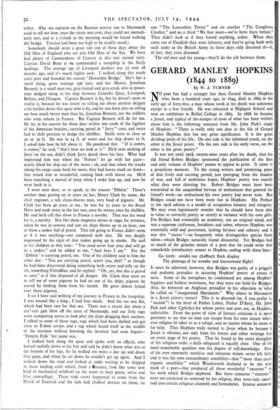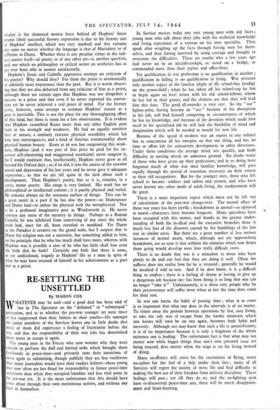GERARD M ANLEY HOPKINS (1844 to 1889)
By W. J. TURNER
NO poet has had a stranger fate than Gerard Manley Hopkins who, born a hundred years ago, in 1844, died in 1889 at the early age of forty-five, a man whose work at his death was unknown
except to a few friends. He was educated at Highgate School and won an exhibition to Balliol College in 1863. In 1868 he became a Jesuit, and typIcal of theatemper of most of what has been written
about him is the following sentence from Mr. John Pick's study of Hopkins: "There is really only one date in the life of Gerard
Manley Hopkins that has any great significance. It is the great dividing point of his life. On one side is the informed youth, on the other is the Jesuit priest. On the one side is his early verse, on the other is his great poetry."
It was not until 1918, twenty-nine years after his death, that his old friend Robert Bridges sponsored the publication of the first and only volume of Hopkins' poems to appear in print. It 44une at a propitious moment. To the young writers and promising poets of that lively and exciting period, just emerging from the shadow of war, and full of ambitious hopes, Hopkins' poetry was exactly what they were thirsting for. Robert Bridges must have been astonished at the unqualified fervour of enthusiasm that greeted his friend's work—an enthusiasm his own poetry had never won. But Bridges could not have been more fair to Hopkins. His Preface to the 1918 edition is a model of scrupulous honesty and integrity. We may even legitimately wonder that he should have been able to value so correctly poetry so utterly at variance with his own gifts. For Bridges had essentially an academic, not an original mind, and was a supreme craftsman, fastidious and sober, whereas Hopkins was essentially wild and passionate, lacking beance and sobriety and it was this "excess "—so frequently what distinguishes genius from talent—which Bridges naturally found distasteful. Yet Bridges had so much of the genuine nature of a poet that he could write that remarkable introductory sonnet to Hopkins ending with these lines:
Go forth: amidst our chaffinch flock display Thy plumage of far wonder and heavenward flight!
It must he admitted, however, that Bridges was guilty of a priggish and pedantic prejudice in accusing Hopkins' poetry of errors in taste. Some of the metaphors he condemned are a/hong Hopkins' happiest and boldest inventions, but they were too bold for Bridges. A!so, he betrayed an Anglican prejudice in his objection to 'what he called an "exaggerated Marianism." Why object to Marianism in a Jesuit priest's verses? This is to descend (or, if you prefer it, "ascend ") to the level of Father Lahey, Father D'Arcy, Mr. John Pick and other Catholics for whom priest and poet are, in Hopkins, indivisible. From the point of view of literary criticism it is more pertinent to say that no man can escape from his own nature what- ever religion he takes to as a refuge, and no matter whom he turns to for help. That Hopkins truly turned to Jesus when he became a Jesuit is obvious, not only from his letters and other writings but on every page of his poetry. That he found in the strict discipline of his religious order a daily safeguard is equally clear. One of his most'remarkable qualities was his degree of self-knowledge. Fear of his own extremely sensitive and sensuous nature never left him, and it was his own extraordinary sensibility—that "more than usual organic sensibility" which Wordsworth declared to be the true mark of a poet—that produced all those wonderful " excesses " in his work which Bridges deplored. But these sensuous "excesses" were not exorcised or removed by his religion, they were only canal- ised into certain religious channels and formularies. Intense sensuous vitality is the elemental motive force behind all Hopkins' finest poems (their successful literary expression is due to the literary cast of Hopkins' intellect, which was very marked) and this remains the same no matter whether the language is that of Mariolatry or of a Hymn to Diana. Whether there is any peculiar virtue in the sub- ject matter itself—of poetry or of any other art—is another question, and one which no philosopher or critical writer on aesthetics has as yet ever been able to answer satisfactorily.
Hopkins's Jesuit and Catholic appraisers attempt no criticism of his poetry? Why should they? - For them the priest is axiomatically of infinitely more importance than the poet. But it is worth observ- ing that they are also debarred from any criticism of him as a priest, although there are certain signs that Hopkins was not altogether a success as a priest and that even if he never regretted his conver- sion yet he never achieved a real peace of mind. For the literary critic, however, some attempt to estimate Hopkins' stature as a poet is inevitable. This is not the place for any thoroughgoing effort of this kind, but there is room for a few observations. It is evident that Hopkins resembled Keats more than any other English poet both in his strength and weakness. He had an equally sensitive love of nature, a similarly extreme physical sensibility which led him into extravagances, and a kind of luscious sentimentality about physical human beauty. Keats at 26 was fast outgrowing this weak- ness, Hopkins (and it was part of that price he paid for his ex- cessive self-chastening and exaggerated asceticism) never outgrew it, for I would maintain that, intellectually, Hopkins never grew at all beyond his Oxford days ; or, if he did, it was the source of the extreme unrest and depression of his last years and he never gave it adequate expression; so that we are left quite in the dark about such a development. Then Hopkins's poetry, fine as it is, remains, in a sense, minor poetry. His range is very limited. His work has no philosophical or intellectual content ; it is purely physical and verbal. He remains always on the sensuous surface of things. This can be a great merit in a poet if he has also the power—as Shakespeare and Dante had—to imbue the physical with the metaphysical Nor is he a profound imaginative poet as Wordsworth is. He never conveys any sense of the mystery in things. Perhaps as a Roman Catholic he was inhibited from conceiving of any since the whole truth had, once for all, been revealed to mankind. Yet Dante in the Paradiso is creative on the grand scale, but I suspect that to Dante his religion was not a necessity, but something added to him, on the principle that he who has much shall have more, whereas with Hopkins was it possibly a case of he who has little shall lose even the little that he hath? Certainly one feels that there is some, as yet undisclosed, tragedy in Hopkins' life as a man in spite of what he may have rescued of himself in his achievements as a poet and as a priest.



























 Previous page
Previous page